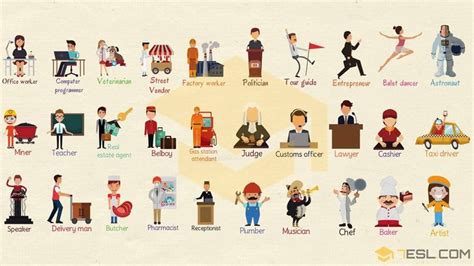In today's fast-paced and ever-evolving job market, it's essential to explore various career options to find the best fit for your skills, interests, and values. If you're considering a career starting with the letter S, you're in luck! There are numerous exciting and rewarding S professions to explore. In this article, we'll delve into the top S careers, their job descriptions, required skills, and growth prospects.
The Importance of Exploring S Careers
With the rise of technology, globalization, and shifting workforce dynamics, it's crucial to stay adaptable and open to new career opportunities. Exploring S careers can help you discover emerging fields, in-demand jobs, and industries that align with your strengths and passions. Whether you're a student, a career changer, or simply looking to expand your professional horizons, this article will provide valuable insights into the world of S professions.

Top S Careers
From science and technology to social sciences and healthcare, the range of S careers is vast and diverse. Here are some top S professions to consider:
1. Software Engineer
Software engineers design, develop, and test software applications for a wide range of industries, including gaming, finance, and healthcare. With the rapid growth of technology, software engineering is a highly sought-after career.
- Required skills: Programming languages (e.g., Java, Python, C++), software development methodologies (e.g., Agile, Scrum), problem-solving, and analytical thinking.
- Growth prospects: High demand, with a projected 21% growth rate from 2020 to 2030 (according to the Bureau of Labor Statistics).
2. Sales Manager
Sales managers oversee sales teams, set sales targets, and develop strategies to meet customer needs. This career requires strong leadership, communication, and negotiation skills.
- Required skills: Sales experience, leadership, communication, and interpersonal skills, as well as data analysis and problem-solving.
- Growth prospects: Moderate growth, with a projected 4% growth rate from 2020 to 2030 (according to the Bureau of Labor Statistics).
3. Scientist ( Various Fields)
Scientists work in various fields, including biology, chemistry, physics, and environmental science. They conduct research, collect data, and analyze results to advance knowledge and develop new technologies.
- Required skills: Strong analytical and problem-solving skills, attention to detail, and the ability to work independently and collaboratively.
- Growth prospects: Varying growth rates depending on the field, with some areas (e.g., biotechnology) experiencing high growth and others (e.g., chemistry) experiencing slower growth.
4. Social Worker
Social workers support individuals, families, and communities in need, providing counseling, advocacy, and connective services.
- Required skills: Empathy, communication, and interpersonal skills, as well as knowledge of social policies and community resources.
- Growth prospects: High demand, with a projected 13% growth rate from 2020 to 2030 (according to the Bureau of Labor Statistics).
5. Speech-Language Pathologist
Speech-language pathologists work with individuals with communication and swallowing disorders, developing personalized treatment plans to improve their speech and language skills.
- Required skills: Strong communication and interpersonal skills, as well as knowledge of speech and language development, disorders, and treatments.
- Growth prospects: High demand, with a projected 25% growth rate from 2020 to 2030 (according to the Bureau of Labor Statistics).
Steps to Pursue an S Career
If you're interested in pursuing an S career, follow these steps:
Research and Explore
- Learn about various S careers, their job descriptions, required skills, and growth prospects.
- Explore job market trends, industry reports, and professional networks to stay informed.
Develop Relevant Skills
- Acquire the necessary skills and knowledge for your chosen S career through education, training, or certifications.
- Develop transferable skills, such as communication, problem-solving, and analytical thinking, to enhance your career prospects.
Network and Build Connections
- Attend industry events, conferences, and job fairs to connect with professionals in your desired field.
- Build relationships with mentors, colleagues, and peers to gain insights and stay updated on industry developments.
Pursue Internships and Entry-Level Positions
- Apply for internships or entry-level positions to gain hands-on experience and build your portfolio.
- Utilize job search platforms, company websites, and professional networks to find job opportunities.
Stay Adaptable and Continuous Learning
- Stay up-to-date with industry trends, technologies, and best practices through ongoing education and training.
- Be open to new opportunities, challenges, and career paths to ensure long-term success and growth.

Gallery of S Careers





FAQs
What are some in-demand S careers?
+Some in-demand S careers include software engineering, data science, scientific research, social work, and speech-language pathology.
What skills are required for S careers?
+Required skills for S careers vary depending on the profession, but common skills include analytical thinking, problem-solving, communication, and interpersonal skills.
How can I pursue an S career?
+To pursue an S career, research and explore different options, develop relevant skills, network and build connections, pursue internships and entry-level positions, and stay adaptable and continuous learning.
Conclusion
Exploring S careers can lead to rewarding and challenging professions that align with your passions and strengths. By researching and understanding the various S careers, developing relevant skills, and staying adaptable, you can set yourself up for success in this exciting and ever-evolving job market. Remember to stay curious, keep learning, and always be open to new opportunities and challenges.
